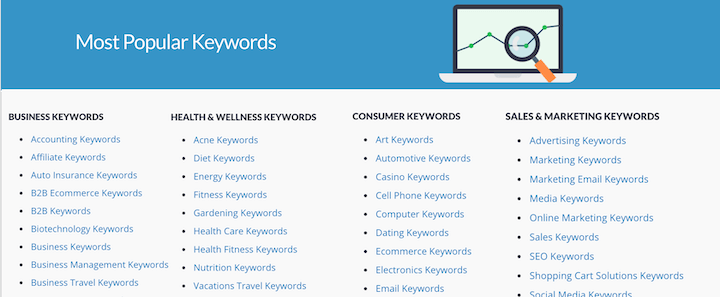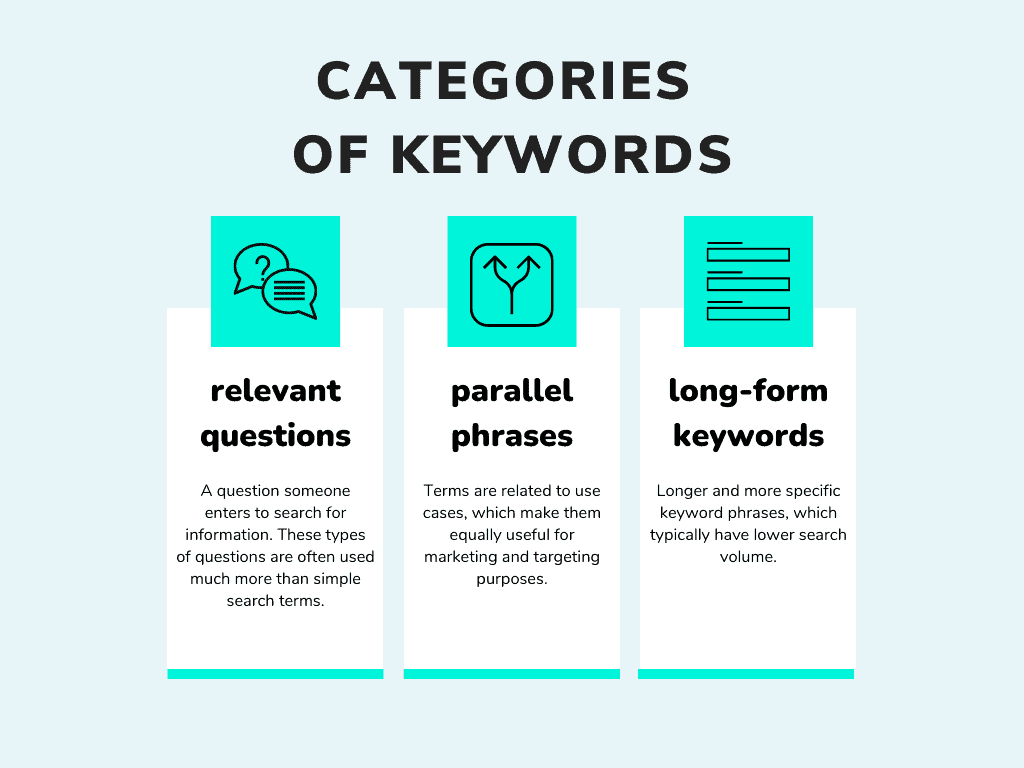Have you ever wondered how websites manage to grab your attention so effortlessly? The secret often lies in the power of SEO keywords.
These little words and phrases are the hidden gems that can make or break your website’s visibility. But what are the most popular SEO keywords that can boost your site’s presence? You might be surprised to learn that choosing the right keywords can significantly impact your website’s success.
Imagine being able to reach your ideal audience just by tweaking a few phrases. Sounds intriguing, right? Stick around as we delve into the world of SEO keywords and reveal which ones are the most sought-after. You’ll discover how to leverage them to enhance your website’s ranking and engage your audience. Keep reading to uncover the secrets that can transform your online strategy.

Credit: www.wordstream.com
Keyword Basics
Understanding the basics of SEO keywords is crucial for anyone looking to enhance their online presence. Keywords act as the roadmap that guides potential visitors to your website. They are the terms and phrases users type into search engines when seeking information. Just imagine if you could predict what your audience is searching for and serve it right to them! By mastering keyword basics, you can significantly boost your site’s visibility.
Importance Of Keywords
Keywords are the bridge between your content and the audience you want to reach. They help search engines understand what your website is about. Without relevant keywords, your content might get lost in the vast sea of information online. Think about your own search habits—don’t you often rely on specific terms to find what you’re looking for? By targeting the right keywords, you align your content with those habits, increasing your chances of being found.
Types Of Keywords
Keywords come in various types, each serving a different purpose. You have short-tail keywords, which are typically one or two words and are quite broad. For example, “shoes” is a short-tail keyword. Then, there are long-tail keywords—more specific phrases like “best running shoes for flat feet.” These are less competitive and can bring more targeted traffic. Consider what you are searching for; aren’t you more specific when you have a particular need?
There are also branded keywords, which include your brand name. These are essential for maintaining your brand presence online. And don’t forget about local keywords, crucial for businesses aiming to capture a local market. Imagine a small café using “best coffee shop in Seattle”—this can attract nearby coffee lovers to their door.
Understanding these types allows you to strategically place them in your content, making it easier for search engines—and your potential customers—to find you.
Do you see how these different types of keywords can serve your unique needs? Which type do you think would be most beneficial for your business?
Identifying Popular Keywords
Popular SEO keywords are words people search often online. Finding these keywords helps boost website visibility. Search engines like Google show sites with these keywords more frequently, attracting more visitors. Identifying such keywords is crucial for effective online marketing strategies.
Identifying popular keywords is a crucial step for anyone looking to boost their website’s SEO. It can feel like searching for a needle in a haystack, but with the right approach, it becomes a manageable task. Knowing which keywords are frequently searched helps you understand what your audience is interested in, allowing you to create content that meets their needs. Finding these keywords isn’t just about guessing or using the most obvious terms. It requires a strategic approach and the right tools. Are you ready to dive into some practical tips? ###Tools For Keyword Research
Using the right tools can simplify your keyword research significantly. Google Keyword Planner is a favorite among many. It’s free and provides insights directly from the search giant itself. Other popular tools include Ahrefs and SEMrush, which offer comprehensive data on keyword trends, traffic estimates, and more. These tools help you discover keywords you might not have thought of, giving you a broader perspective. Don’t overlook Ubersuggest, which is user-friendly and great for beginners. It offers suggestions based on your input, including long-tail keywords that can be less competitive. ###Analyzing Search Volume
Understanding search volume is key to identifying popular keywords. High search volume indicates a topic’s popularity and potential traffic boost. However, it’s not just about picking the highest numbers. Balance is crucial. Keywords with moderate search volume can often provide better results, especially for newer or smaller sites. Think about what your audience might be typing into that search bar. Does it match the search volume data you’re seeing? Make sure your keywords align with realistic search behaviors. ###Assessing Competition
Competition can make or break your keyword strategy. High competition keywords are often dominated by established sites, making it hard for newcomers to rank. Look at the domain authority of competitors ranking for your chosen keywords. Are these sites giants like Amazon or smaller blogs? This gives you a sense of the playing field. Consider going for keywords with lower competition but decent search volume. This sweet spot can boost your chances of ranking higher. Have you thought about how competition affects your keyword choices? It’s not just about the words themselves but who you’re up against. Tailor your strategy accordingly and find those opportunities that others might overlook.Industry-specific Keywords
Industry-specific keywords drive SEO by targeting terms relevant to a particular field. Popular SEO keywords often include commonly searched terms like “digital marketing,” “e-commerce,” and “content creation. ” These keywords help businesses attract the right audience by aligning with user search intent.
When you think about optimizing your website for search engines, industry-specific keywords play a crucial role. These keywords are tailored to fit specific sectors, ensuring your content reaches the right audience. By focusing on industry-specific terms, you can effectively target potential customers who are actively searching for your products or services. Imagine running an online store. Your keyword strategy would differ vastly from someone in the health sector. This is where industry-specific keywords come into play, helping you stand out in your unique field. ###E-commerce Keywords
In e-commerce, keywords are everything. They define your product listings and influence your online visibility. Terms like “buy online,” “cheap deals,” or “discount offers” can attract budget-conscious shoppers. Think about your own shopping habits. Wouldn’t you prefer a site that speaks your language? Using precise product names, categories, and descriptors can make a significant difference in search results. ###Technology Keywords
Technology evolves rapidly, and so do its keywords. Whether it’s “AI software,” “cloud computing,” or “smart gadgets,” staying updated with tech trends is vital. These keywords not only attract tech enthusiasts but also position your content as cutting-edge. Ever found yourself bewildered by tech jargon? Simplifying terms and using relevant keywords can bridge the gap, making information accessible to all. ###Health And Wellness Keywords
In the health sector, keywords are all about trust and accuracy. Words like “natural remedies,” “mental health tips,” or “wellness programs” resonate with users seeking reliable information. Consider your last health-related search. You likely wanted clear and concise answers. Providing this through targeted keywords builds credibility and encourages engagement. ###Finance Keywords
Finance keywords are often detail-oriented, focusing on terms like “investment strategies,” “tax planning,” or “personal finance tips.” These words cater to individuals looking to manage their money wisely. Have you ever searched for ways to save more or invest smarter? The right finance keywords can guide users toward valuable resources, fostering trust in your expertise. Industry-specific keywords are more than just words; they’re a bridge to connect with your audience. Are you using the right ones to drive traffic and engagement?Long-tail Keywords
Long-tail keywords, often less competitive, target specific search queries. They help in capturing niche audiences effectively. Popular SEO keywords usually have high search volume but face intense competition.
Long-tail keywords are a powerful tool in the SEO arsenal. These are keywords that are longer and more specific than the usual one or two-word phrases. They may not have high search volumes, but they can attract highly targeted traffic to your site. When I first started using them, I noticed a significant increase in engagement and conversions. Have you ever considered how these niche phrases could impact your SEO strategy?Benefits Of Long-tail Keywords
Long-tail keywords are less competitive, making it easier for your content to rank higher on search engines. They attract highly targeted visitors who are more likely to convert. Imagine someone searching “best vegan restaurants in downtown Seattle” versus just “restaurants.” The first searcher knows what they want, and if you can provide it, they’re more likely to become a customer. Using long-tail keywords can improve your site’s visibility in specific searches. This means you reach people who are actively looking for what you offer. It’s like fishing with a spear rather than a net—more precision, less wasted effort.Finding Niche Keywords
Finding the right long-tail keywords can feel like searching for a needle in a haystack. But it doesn’t have to be. Tools like Google Keyword Planner or Ubersuggest can help you discover what people are searching for. Look for phrases that relate closely to your products or services. Think about the questions your potential customers might ask. For instance, if you sell eco-friendly water bottles, potential long-tail keywords could be “best eco-friendly water bottle for hiking” or “BPA-free water bottle for kids.” Engage with your audience to uncover these hidden gems. Ask your customers what they search for when looking for products like yours. You might be surprised at the insights they provide. Incorporating these keywords into your content strategy can make your site more discoverable and relevant to your target audience. Are you ready to start finding your niche and boosting your SEO?Trends In Seo Keywords
SEO keywords change with technology and user behavior. Understanding these trends helps businesses stay ahead. This ensures their content reaches the right audience. Let’s explore some key trends shaping SEO keywords today.
Impact Of Voice Search
Voice search is growing rapidly. People use digital assistants like Siri and Alexa. This means keyword phrases are getting longer and more conversational. Users often ask questions, so keywords reflect this. Businesses need to adapt by using natural language in their content. This helps them appear in voice search results.
Mobile Search Trends
Mobile searches surpass desktop searches now. This shift influences how keywords are used. Mobile users often search for local information. Keywords should include location-specific terms. Shorter keywords work well on mobile due to screen size limits. Optimizing for mobile search improves visibility and engagement.

Credit: changetower.com
Keyword Optimization Strategies
Keyword optimization is a crucial part of SEO that can make or break your online presence. The right keywords can catapult your site to the top of search engine results, bringing in a flood of traffic. But how do you make sure you’re choosing and using these keywords effectively?
On-page Optimization
On-page optimization is your playground for making keywords work for you. It’s where you strategically place keywords in your titles, headers, and throughout your content. Think about how often you search for something online and scan the results. You want your page to be the one that catches attention because it matches the searcher’s intent perfectly.
Consider using tools like Google Keyword Planner or SEMrush to find popular keywords related to your niche. Once you have your list, integrate these keywords naturally into your page’s metadata, such as titles and descriptions. This isn’t just about stuffing as many keywords as possible; it’s about making them flow seamlessly with your content.
Imagine you’re a reader. Would you stay on a page that reads awkwardly because of forced keywords? Probably not. The key is to maintain readability while ensuring your keywords are present. Is your page answering a question or solving a problem? That’s what search engines want to see.
Content Creation
Creating content is not just about writing; it’s about delivering value while incorporating your chosen keywords effectively. Think of your content as a conversation with your audience. What are they looking for, and how can you provide it?
Start by brainstorming topics that your audience cares about. These should align with your chosen keywords. For instance, if your keyword is “best hiking trails,” your content could explore a list of top trails, safety tips, or even personal hiking experiences. This approach not only makes your content engaging but also naturally integrates keywords.
Remember to keep your content fresh and updated. Search engines favor pages that regularly update their information. So, revisit older posts and add new insights or data. Are you engaging your audience and encouraging them to stay on your page longer?
Keyword optimization strategies are not set in stone; they evolve with search engine algorithms and audience behavior. Always be ready to adapt and refine your approach. What strategies have worked for you, and how can you improve them further?
Tracking Keyword Performance
Understanding popular SEO keywords helps in tracking keyword performance effectively. High search volume keywords drive traffic and improve visibility. Choosing the right keywords boosts your site’s chances of ranking well.
Tracking the performance of your SEO keywords is like checking the pulse of your digital marketing efforts. If you ignore it, you risk missing out on valuable insights that could shape your strategy. By keeping a close eye on how your keywords are performing, you can adjust your approach to maximize visibility and drive more traffic to your site.Using Analytics Tools
Utilizing analytics tools can be a game-changer for understanding keyword performance. Google Analytics is a fantastic starting point, offering insights into which keywords are driving the most traffic. Tools like SEMrush and Ahrefs provide even deeper dives, showing you how keywords rank over time and how your competitors are performing. Think of analytics tools as your SEO compass. They guide you by providing real-time data on keyword performance. You don’t have to guess which keywords are working; the data tells you. This allows you to make informed decisions about where to focus your efforts.Adjusting Strategies
Once you have data on how your keywords are performing, it’s crucial to adjust your strategy accordingly. If a keyword isn’t driving traffic, it might be time to refine or replace it. On the other hand, if a keyword is performing well, consider creating more content around it to capitalize on its success. The ability to pivot is essential in SEO. If a keyword isn’t working, don’t be afraid to try something new. Perhaps long-tail keywords or a different phrasing could work better. Staying flexible allows you to adapt to changing trends and maintain your site’s relevance. Have you ever found a keyword that unexpectedly brought in loads of traffic? Sometimes, the audience responds to keywords in ways you wouldn’t anticipate. Tracking and adjusting ensure you’re always in tune with what works best for your site.
Credit: sjdigitalsolutions.com
Frequently Asked Questions
What Are The Most Trending Keywords?
Popular keywords change frequently. As of now, hot keywords include AI technology, remote work, health tips, sustainable living, and digital marketing trends. Keep up with keyword tools like Google Trends to stay current.
What Is The #1 Searched Thing On Google?
The #1 searched thing on Google frequently changes. Popular searches often include trending news, celebrities, or viral topics. Google Trends provides real-time data on current top searches, reflecting what’s capturing public interest at any given moment. Regularly checking Google Trends can offer insights into the most searched topics.
What Are The 4 Types Of Keywords In Seo?
The four types of keywords in SEO are short-tail, long-tail, LSI, and intent-targeting keywords. Short-tail keywords are broad, while long-tail keywords are specific. LSI keywords provide context. Intent-targeting keywords match user intent, focusing on informational, navigational, transactional, and commercial investigation.
Each type plays a unique role in search engine optimization.
How Do I Find Trending Seo Keywords?
Use Google Trends to identify popular keywords. Utilize tools like SEMrush and Ahrefs for keyword analysis. Explore social media platforms for emerging trends. Analyze competitor websites for high-ranking keywords. Leverage keyword planner tools to discover relevant trending terms.
Conclusion
Popular SEO keywords are essential for online visibility. They help websites rank higher. Choosing the right keywords can boost traffic. Focus on words relevant to your audience. Research trends regularly. Adapt to changes in search behavior. Keep content fresh and engaging.
Use tools for keyword analysis. Stay updated with industry shifts. Remember, understanding your audience is key. Keywords should reflect their interests. This approach enhances connection. It also improves engagement. Craft content that resonates with your readers. This way, you make a lasting impact.
Your SEO strategy becomes more effective. Embrace the power of popular keywords.




